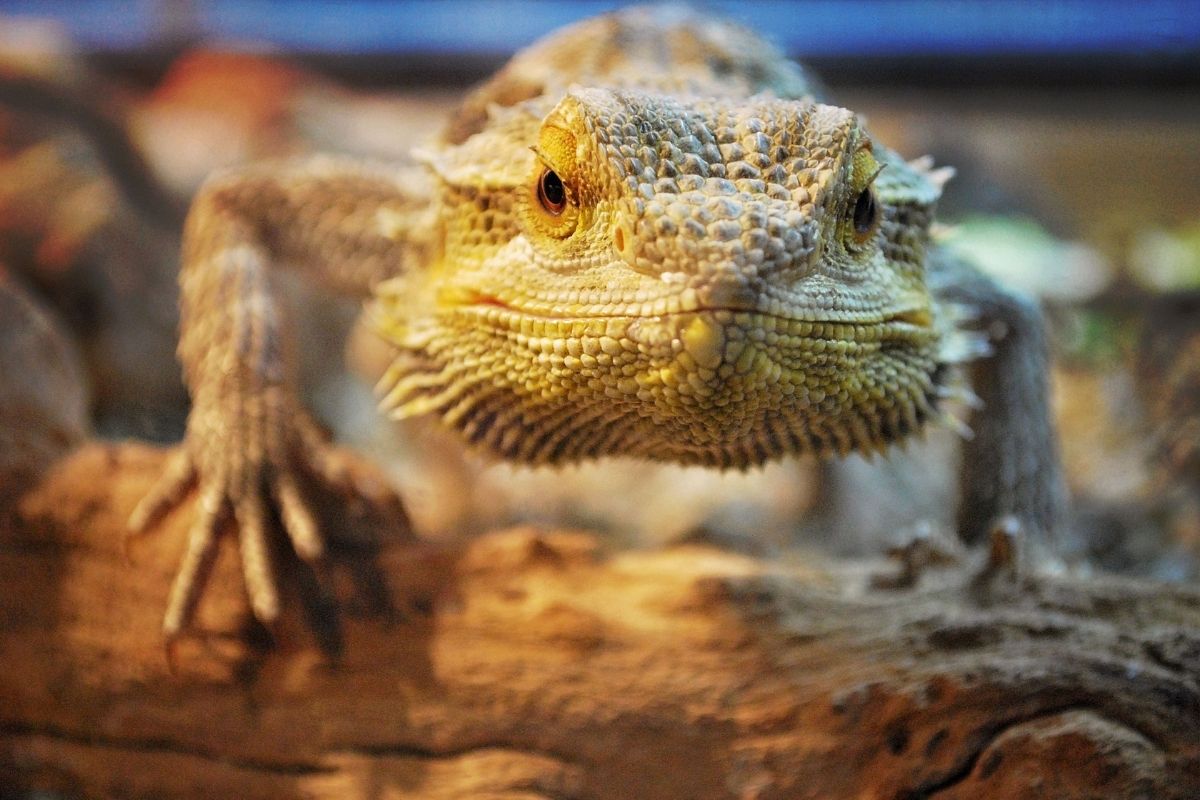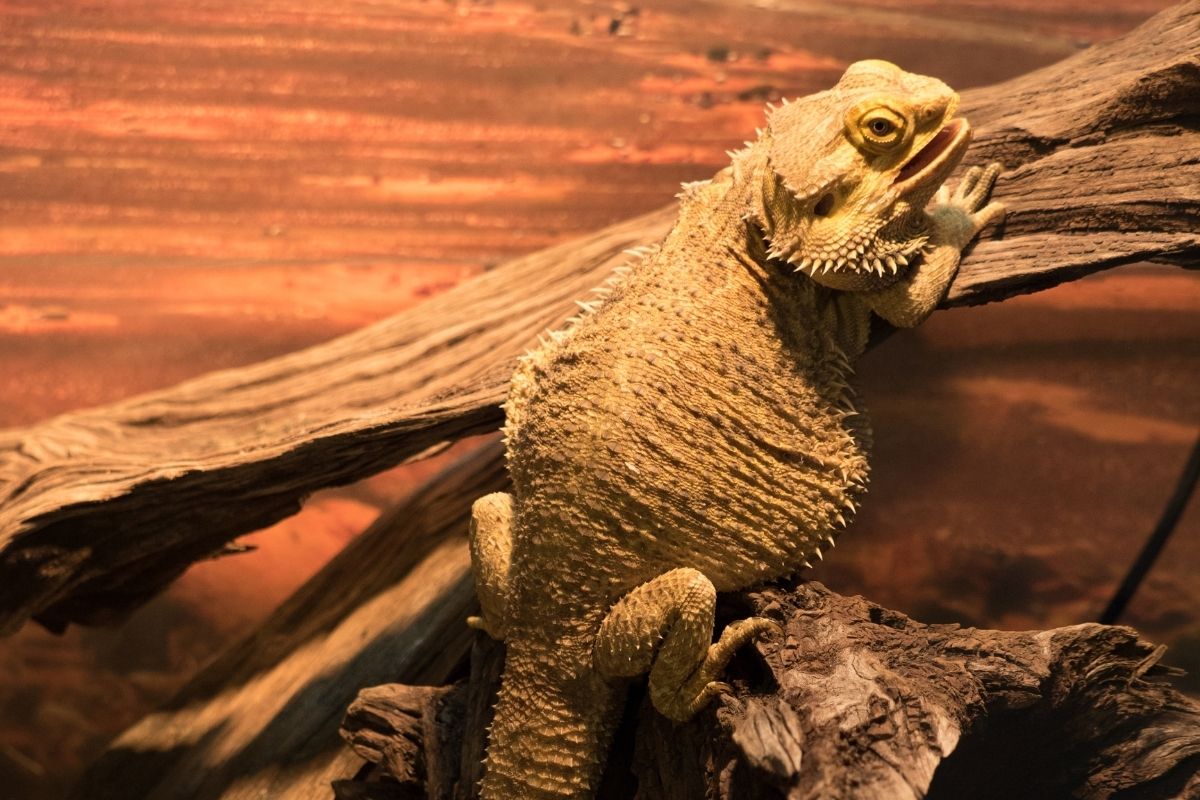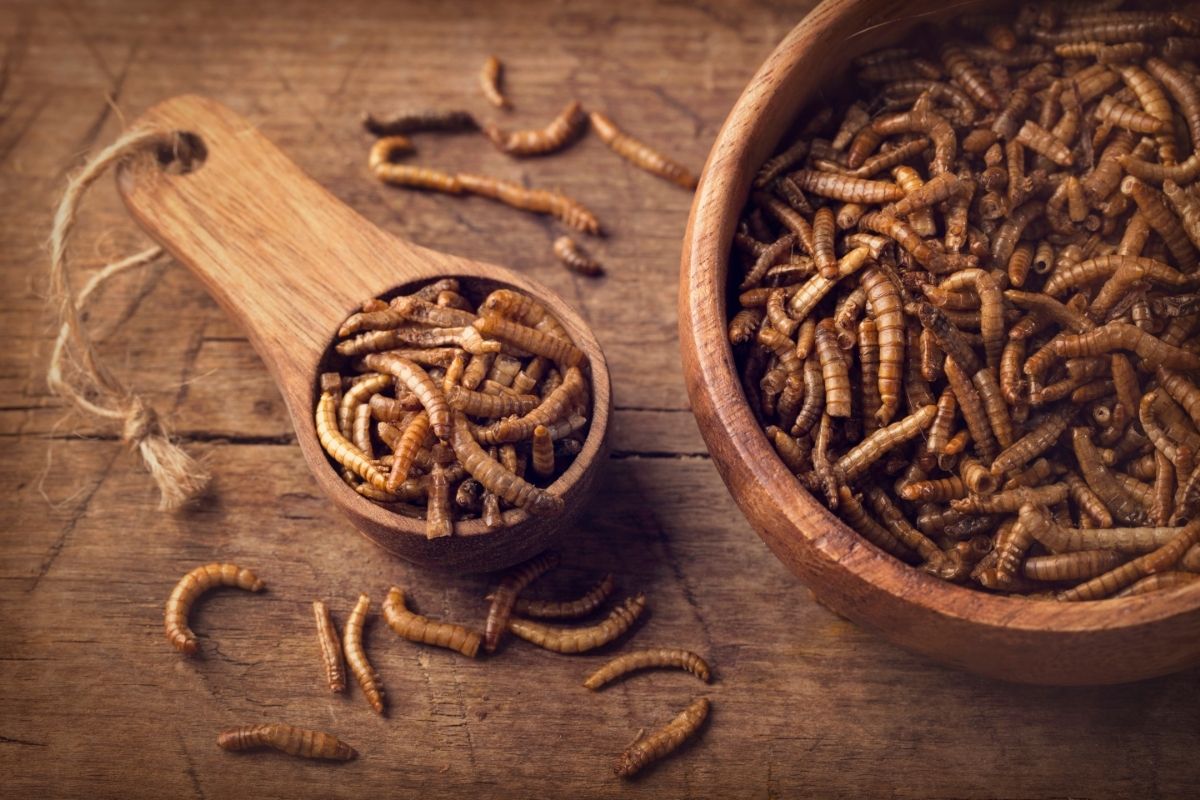It’s no secret that bearded dragons love mealworms.
Think of your favorite snack that you could eat over and over until you feel sick – that’s a mealworm to a bearded dragon.

However, many people question whether mealworms are good for bearded dragons or if they’re actually bad.
After all, it’s not good for us to overindulge in our favorite snacks all the time…right?
In this article, we will discuss whether or not you feed bearded dragons mealworms and if mealworms are bad for your bearded dragon.
Read on for more!
What Are Mealworms?
Mealworms are small roundworms that can be found in moist soil. They are also known as nightcrawlers because they are most active at dusk and dawn.
These little guys have been around since the dinosaurs were roaming the earth, and they’ve survived through the ages.
In fact, they even inevitably make their way into our food supply today – in tiny, unnoticeable pieces.
Bearded dragons love mealworms! But they don’t just love them, they crave them.
If you give your bearded dragon some mealworms, it will gobble them up immediately. It may even start eating them right out of your hand!
And when it does, it’ll get excited and want more.
Are Mealworms Bad For Your Bearded Dragon?
It is okay for your bearded dragon to eat mealworms, but you should never overfeed them with this delicacy.
As it turns out, mealworms are indeed bad for your bearded dragon.
This is because they contain an excessive amount of phosphor and fat, which are bad for bearded dragons.
They also contain very little calcium and protein, which bearded dragons need to grow.
Additionally, if you feed mealworms to your pet bearded dragon, this can cause them to become addicted, and they will eventually refuse to eat other foods.
Now that we have covered the basics let’s delve into these points in more detail!
Mealworms Are Bad For Bearded Dragons Because They Are High In Phosphorus
The ratio of calcium/phosphorus in bearded dragon food (feeder insects) is actually pretty awful.
The ideal ratio in feeder insects should be 2:1, but most of the time it is the opposite – 1:2.
This is especially true of mealworms, which can also be worse, reaching ratios of 1:3 or 1:4. Shocking!
The reality is that bearded dragons need plenty of calcium to reduce the risk of soft bones, known in bearded dragons as metabolic bone disease.
So, if you plan on feeding mealworms to your bearded dragon, then you’re also going to need to feed them calcium supplements.
This is why you should moderate the number of mealworms you feed your pet beardie.
Mealworms Are Bad For Bearded Dragons Because They Are High In Fat

Bearded dragons need food in their diet that is high in protein and low in fat. Mealworms are the exact opposite.
Like many other pets, bearded dragons need exercise.
On average, bearded dragons in the wild get a lot more exercise than bearded dragons in captivity.
Because most terrariums are quite small, the bearded dragons cannot run around as much, and consequently, get less exercise and need less fat in their diets.
This becomes more of a problem when people overfeed their pet bearded dragons. Bearded dragons should not eat feeder insects every single day.
Their daily food intake should consist mostly of greens. Contrary to popular belief, this is not a cruel thing to do to your bearded dragon.
By feeding your bearded dragon too many mealworms, you increase their risk of fatty liver disease.
Mealworms Are Bad For Bearded Dragons Because They Are Addictive
This sounds like a joke, but it is actually very true and a real issue for many pet bearded dragons.
If you feed a bearded dragon too many mealworms, then it will become addicted. Just think of humans and sugar.
The more sugar we eat, the more sugar we need. This is what mealworms are like for bearded dragons.
How Many Mealworms Should You Feed Your Bearded Dragon Daily?
There is no need to give your bearded dragon any mealworms, in reality.
However, they do make for a real tasty treat, so it may be nice to feed them to your beardie every once in a while!
Although, if you do want to feed mealworms to your beardie daily, then you only need to feed them two or three, and this is as a supplement to their usual insect diet.
Is It Safe For Baby Or Juvenile Bearded Dragons To Eat Mealworms?

No. Ideally, you should not feed baby or juvenile bearded dragons any mealworms whatsoever.
What Foods Should You Feed Your Bearded Dragons?
The diet of a baby dragon needs to be a close replica of what they would eat if they were in the wild.
So, it should include a variety of vegetables, meat, greens, fruits, and weeds. Fruit should be given to bearded dragons sparingly because of its sugar content.
Additionally, you should reduce the amount of meat you’re feeding your bearded dragon as it gets older, too.
This is for a similar reason to limiting the number of mealworms in its diet – the lack of exercise a pet beardie gets compared to a beardie in the wild.
You should also prepare vegetables and fruit by peeling and cutting them into small pieces and removing any pips present.
Let’s look at the ideal bearded dragon diet in a little more detail:
Bearded Dragons And Live Food
Crickets are by far the best live food you can feed your bearded dragon.
The ideal cricket size should be no bigger than the space between your bearded dragon’s eyes. You can buy crickets at a variety of pet stores or online.
Bearded Dragons And Vegetables
These are the best vegetables for bearded dragons to eat:
- Ocra
- Bell Peppers
- Butternut squash
- Peas
- Courgette
- Green Beans
- Sweet Potato
- Broccoli (in small amounts around once a week)
- Acorn squash
Bearded Dragons And Greens
The following greens are perfect for a bearded dragon diet:
- Floret mix
- Kale
- Parsley
- Collards
- Spring greens
- Lambs Lettuce
- Turnip greens
- Dandelion greens
- Clover
Bearded Dragons And Weeds
These are the best weeds for a bearded dragon:
- Dead nettle
- Catsear
- Plantain
- Dandelion
What Should You Feed Baby And Juvenile Bearded Dragons?
Baby Bearded Dragons
Baby beardies need more insects and fewer vegetables when it comes to their diets. They should also be fed up around three times per day.
Juvenile Bearded Dragons
You should aim to feed juvenile bearded dragons insects around 5 times a week and ensure you’re giving them greens to eat every day.
Frequently Asked Questions
Are Mealworm Beetles Safe For Bearded Dragons To Eat?
Yes! Mealworms may be bad for bearded dragons, but mealworm beetles are fine! This is because they contain less fat and more protein.
However, most bearded dragons do not actually like the taste of mealworm beetles!
Are Superworms Or Mealworms Better For Bearded Dragons?
Both superworms and mealworms are bad for bearded dragons. This is because both are high in fat and low in protein.
Additionally, neither one contains essential vitamins and minerals that are needed by a bearded dragon.
If you want to give your bearded dragon something nutritious to eat, then you should use a combination of insects, greens, vegetables, and fruit, in different amounts depending on age.
Can Mealworms Bite?
Yes, mealworms can bite – and their bite is very strong. However, they will not be able to do much harm to an adult bearded dragon despite any rumors.
Are Freeze-Dried Mealworms Good For Bearded Dragons?
No. Freeze-dried mealworms are not suitable for bearded dragons.
This isn’t just because they don’t have enough nutrients; it’s also because they can cause digestive problems if eaten in large quantities.
Are Mealworms Difficult To Digest?
Contrary to popular belief – no! Mealworms are not difficult to digest.
Many people believe this to be the case because of the mealworms’ sturdy chitinous exoskeleton.
However, bearded dragons have very different digestion from humans and have no problem digesting the exoskeleton of mealworms.
Although, if a bearded dragon eats mealworms in excess, then its digestive tract may become irritated.
If this ever happens, then they may lose the ability to digest their food properly, which may cause damage or illness.
You may also find undigested mealworms and other feeder insects in their feces.
For this reason, if you choose to feed your pet bearded dragon mealworms, you should only feed them mealworms with a soft exoskeleton – ones that have recently been shed.
Final Thoughts
Bearded dragons may love mealworms, but they should never be allowed to eat them in excess. Mealworms are very bad for bearded dragons.
This is because they are high in fat and phosphorus and are highly addictive.
In short, they do not have the requirements that a bearded dragon needs for its diet, so they should be given sparingly.
It is also best to avoid giving mealworms to both baby and juvenile bearded dragons.
As a general rule, bearded dragons need plenty of calcium and protein in their diet, which is why mealworms are no good – as they contain more fats than a pet bearded dragon needs.
The best diet for your bearded dragon consists of more insects, such as crickets, when they’re younger.
As they age, you should reduce the number of live food they eat and replace it with more vegetables, such as okra, sweet potato, and peas.
You should also feed them greens and weeds, such as parsley, plantain, kale, and dead nettle.
